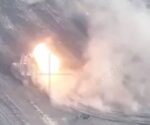Donald Trump humiliated as ‘no war plans’ defence destroyed in new text release | World | News
The Atlantic has published sensitive security information that was accidentally leaked to one of its journalists earlier this week as Donald Trump’s administration plunges into further disarray. The new information also appears to contradict the US President’s claim that “no classified information” was discussed in the messages.
Jeffrey Goldberg, the editor-in-chief of The Atlantic, was accidentally invited to join a chat on the Signal messaging app by National Security Adviser, Michael Waltz. However, “There was no classified material that was shared in that Signal group,” the director of national intelligence, Tulsi Gabbard, told members of the Senate Intelligence Committee on Tuesday (March 25). President Trump answered in a similar manner yesterday afternoon: “It wasn’t classified information.”
Now, in a bombshell update, The Atlantic has decided to share what was discussed in the chat.
The outlet said: “As a general rule, we do not publish information about military operations if that information could possibly jeopardize the lives of US personnel.
“That is why we chose to characterise the nature of the information being shared, not specific details about the attacks.
“The statements by Hegseth, Gabbard, Ratcliffe, and Trump—combined with the assertions made by numerous administration officials that we are lying about the content of the Signal texts—have led us to believe that people should see the texts in order to reach their own conclusions,” the site continued, citing a clear public interest in disclosure.
They write that Goldberg received information on the attacks two hours before the scheduled start of the bombing of Houthi positions. “If this information—particularly the exact times American aircraft were taking off for Yemen—had fallen into the wrong hands in that crucial two-hour period, American pilots and other American personnel could have been exposed to even greater danger than they ordinarily would face.”
At 11:44am ET, Hegseth posted in the chat, in all caps, “TEAM UPDATE:”
The text beneath this began, “TIME NOW (1144et): Weather is FAVORABLE. Just CONFIRMED w/CENTCOM we are a GO for mission launch.” Centcom, or Central Command, is the military’s combatant command for the Middle East. The Hegseth text continues:
- “1215et: F-18s LAUNCH (1st strike package)”
- “1345: ‘Trigger Based’ F-18 1st Strike Window Starts (Target Terrorist is @ his Known Location so SHOULD BE ON TIME – also, Strike Drones Launch (MQ-9s)”
This text was sent 31 minutes before the first US warplanes launched and two hours and one minute before the beginning of a period in which a primary target, the Houthi “Target Terrorist,” was expected to be killed. If the information had fallen into the wrong hands, the Houthis would have had time to prepare for what was meant to be a surprise attack, with potentially catastrophic consequences for the American pilots, The Atlantic has argued.
The Hegseth text then continued:
- “1410: More F-18s LAUNCH (2nd strike package)”
- “1415: Strike Drones on Target (THIS IS WHEN THE FIRST BOMBS WILL DEFINITELY DROP, pending earlier ‘Trigger Based’ targets)”
- “1536 F-18 2nd Strike Starts – also, first sea-based Tomahawks launched.”
- “MORE TO FOLLOW (per timeline)”
- “We are currently clean on OPSEC”—that is, operational security.
- “Godspeed to our Warriors.”
Shortly after, Vice President J. D. Vance texted the group, “I will say a prayer for victory”.
At 1:48pm, Waltz sent the following text, containing real-time intelligence about conditions at an attack site, apparently in Sanaa: “VP. Building collapsed. Had multiple positive ID. Pete, Kurilla, the IC, amazing job.”
Six minutes later, the vice president, apparently confused by Waltz’s message, wrote, “What?”
At 2pm, Waltz responded: “Typing too fast. The first target – their top missile guy – we had positive ID of him walking into his girlfriend’s building and it’s now collapsed.”
Vance responded a minute later: “Excellent.” Thirty-five minutes after that, John Ratcliffe, the CIA director, wrote, “A good start,” which Waltz followed with a text containing a fist, American-flag and fire emojis.
Later that afternoon, Hegseth posted: “CENTCOM was/is on point.” He then told the group that attacks would be continuing. “Great job all. More strikes ongoing for hours tonight, and will provide full initial report tomorrow. But on time, on target, and good readouts so far.”
According to The Atlantic, they asked officials across the Trump administration if they objected to them publishing of the full texts. Most failed to answer. Late yesterday, White House Press Secretary Karoline Leavitt emailed a response arguing that no classified information transmitted in the group chat, but they did not encourage the release of the conversation.
“This was intended to be a an [sic] internal and private deliberation amongst high-level senior staff and sensitive information was discussed. So for those reason [sic] — yes, we object to the release.”
The Atlantic added: “A CIA spokesperson asked us to withhold the name of Ratcliffe’s chief of staff, which Ratcliffe had shared in the Signal chain, because CIA intelligence officers are traditionally not publicly identified.” The officer’s name has been withheld, but everything else remains unredacted.
It is still unclear why a journalist was added to the chat. Waltz, who invited Goldberg, said he was now investigating “how the heck he got into this room.”









